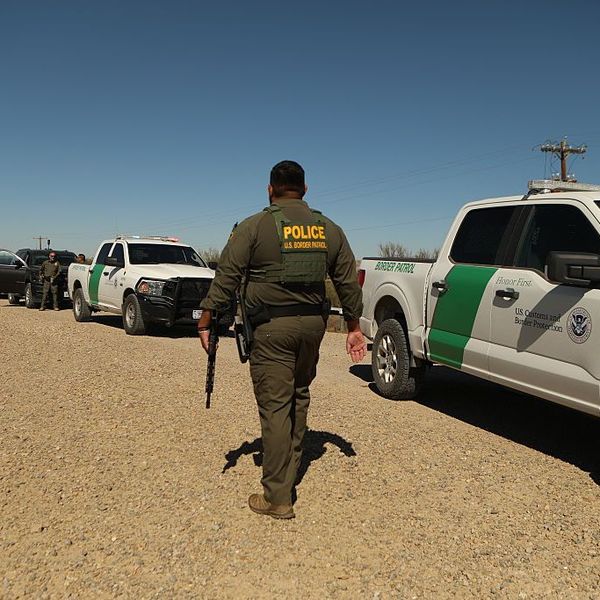US Court Rules Against 'Highly Intrusive' GPS Tracking by Police
Appeals court rules law enforcement cannot put GPS tracking device on your car without probable cause

The case, U.S. v. Katzin, which was brought by the ACLU is being hailed as a victory in the fight against government surveillance.
Last year the Supreme Court unanimously ruled in U.S. v. Jones that attaching a GPS device to a citizen's vehicle constitutes a "search" under the Fourth Amendment. However, due to unclear wording in the case's ruling, police departments around the country have, until now, evaded having to attain warrants to do so.
"GPS devices have become a favored tool of law enforcement, and their highly intrusive nature cries out for clear judicial regulation," read the amicus brief filed by the ACLU, the ACLU of Pennsylvania, Electronic Frontier Foundation, and the National Association of Criminal Defense Lawyers.
"Today's decision is a victory for all Americans because it ensures that the police cannot use powerful tracking technology without court supervision and a good reason to believe it will turn up evidence of wrongdoing," said ACLU Staff Attorney Catherine Crump, who argued before the three-judge panel. "These protections are important because where people go reveals a great deal about them, from who their friends and business associates are to what doctors they go to."
_____________________
An Urgent Message From Our Co-Founder
Dear Common Dreams reader, The U.S. is on a fast track to authoritarianism like nothing I've ever seen. Meanwhile, corporate news outlets are utterly capitulating to Trump, twisting their coverage to avoid drawing his ire while lining up to stuff cash in his pockets. That's why I believe that Common Dreams is doing the best and most consequential reporting that we've ever done. Our small but mighty team is a progressive reporting powerhouse, covering the news every day that the corporate media never will. Our mission has always been simple: To inform. To inspire. And to ignite change for the common good. Now here's the key piece that I want all our readers to understand: None of this would be possible without your financial support. That's not just some fundraising cliche. It's the absolute and literal truth. We don't accept corporate advertising and never will. We don't have a paywall because we don't think people should be blocked from critical news based on their ability to pay. Everything we do is funded by the donations of readers like you. Will you donate now to help power the nonprofit, independent reporting of Common Dreams? Thank you for being a vital member of our community. Together, we can keep independent journalism alive when it’s needed most. - Craig Brown, Co-founder |

The case, U.S. v. Katzin, which was brought by the ACLU is being hailed as a victory in the fight against government surveillance.
Last year the Supreme Court unanimously ruled in U.S. v. Jones that attaching a GPS device to a citizen's vehicle constitutes a "search" under the Fourth Amendment. However, due to unclear wording in the case's ruling, police departments around the country have, until now, evaded having to attain warrants to do so.
"GPS devices have become a favored tool of law enforcement, and their highly intrusive nature cries out for clear judicial regulation," read the amicus brief filed by the ACLU, the ACLU of Pennsylvania, Electronic Frontier Foundation, and the National Association of Criminal Defense Lawyers.
"Today's decision is a victory for all Americans because it ensures that the police cannot use powerful tracking technology without court supervision and a good reason to believe it will turn up evidence of wrongdoing," said ACLU Staff Attorney Catherine Crump, who argued before the three-judge panel. "These protections are important because where people go reveals a great deal about them, from who their friends and business associates are to what doctors they go to."
_____________________

The case, U.S. v. Katzin, which was brought by the ACLU is being hailed as a victory in the fight against government surveillance.
Last year the Supreme Court unanimously ruled in U.S. v. Jones that attaching a GPS device to a citizen's vehicle constitutes a "search" under the Fourth Amendment. However, due to unclear wording in the case's ruling, police departments around the country have, until now, evaded having to attain warrants to do so.
"GPS devices have become a favored tool of law enforcement, and their highly intrusive nature cries out for clear judicial regulation," read the amicus brief filed by the ACLU, the ACLU of Pennsylvania, Electronic Frontier Foundation, and the National Association of Criminal Defense Lawyers.
"Today's decision is a victory for all Americans because it ensures that the police cannot use powerful tracking technology without court supervision and a good reason to believe it will turn up evidence of wrongdoing," said ACLU Staff Attorney Catherine Crump, who argued before the three-judge panel. "These protections are important because where people go reveals a great deal about them, from who their friends and business associates are to what doctors they go to."
_____________________

